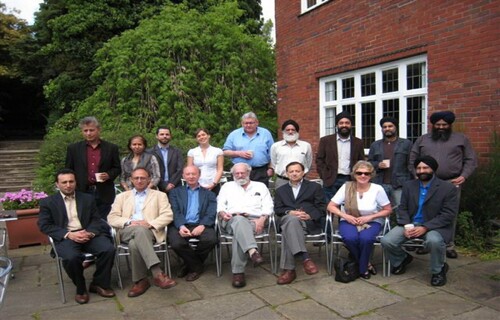Paul R. Brass, the doyen of Indian political science in the USA for almost five decades, died at his home in Acme, WA, on 31 May 2022, at the age of 85, with his wife Susan by his side. For the last few years, Paul had been suffering from Alzheimer’s and was buried on 2 June. He is survived by his wife, daughter, Leah Sarah Livesey (Itzik), and son, David Michael Brass.
Paul was born on 8 November 1936, in Boston, MA to Albert and Eva Brass née Bavely. He attended the Boston Latin School from 1948 to 1954. In 1958 he graduated cum laude from Harvard College with a B.A. in Government. He received his M.A. in Political Science from the University of Chicago in 1959 that was followed by a Ph.D in Political Science in 1964 also from the University of Chicago. In 1965 Paul started teaching at the Henry M. Jackson School of International Studies, University of Washington, where he remained until 1999 when he retired as professor emeritus of political science and international studies.
In a long and distinguished academic career that spanned five decades, Paul’s name became synonymous with government and politics in India, ethnicity and nationalism, communal violence, and latterly, biographical work. He published 13 monographs, several edited volumes and numerous articles and other publications. Among his most celebrated and widely read works are Language, Religion and Politics in North India (1974), Ethnicity and Nationalism: Theory and Comparison (1991), The Politics of India since Independence (1994), The Theft of an Idol: Text and Context in the Representation of Collective Violence (1997), The Production of Hindu-Muslim Violence in Contemporary India (2003), and An Indian Political Life: Charan Singh and Congress Politics, 1957–1967 (three volumes 2012).
From the mid-1960s, while he was working on Uttar Pradesh, Paul took a keen interest in developments in the Punjab, and conducted extensive interviews with key participants involved in the Punjabi Suba movement. This research formed the core of his thesis in Language, Religion and Politics in North India which became the foundational text of the instrumentalist perspective on ethnicity and nationality formation and led to a celebrated debate between him and Francis Robinson whose work on Muslim separatism in northern India is associated with the contrasting primordial position. Paul was well ahead of his time in explaining the dynamics of nationality formation as a result of elite choices and explaining this phenomenon in a comparative, India and global context. For scholars of Sikh nationalism, this remains the primary political science text which has set the standard that remains hard to surpass.
In the late 1990s, Paul became disillusioned with Indian democracy, and once famously described the Nehruvian goal of development as ‘chapatti in the sky’ for most of India’s impoverished masses. His article ‘Political Scientists’ Image of India’ (South Asia, 1998) is a searing indictment of how American political science on India, which emerged out of the area studies programme, was complicit in the ideology of building a strong state. This critical turn was further hastened by his use of Foucauldian methodology to deconstruct the discourses of collective violence in India, and against the efforts of positivist political scientists to explain such violence as rooted in the absence of such factors as social capital. In The Production of Hindu-Muslim Violence in Contemporary India, Paul argued that communal riots in India were not an aberration but the ‘continuation of politics by other means’, the routinisation of violence by which every day Indian politics is conducted ().
Figure 1. Paul, centre front row, with colleagues including Joyce Pettigrew, the late Darshan S. Tatla, and Dipankar Gupta, at the University of Birmingham, UK, (May 2009) at a workshop on Sikh ethnonationalism organised by the author.

For Punjab specialists, Paul made two other major contributions. First, he was the most prominent political scientist to argue convincingly that the roots of the Punjab problem in the early 1980s were to be found in the centralisation drives unleashed by Indira Gandhi and her Congress party, their unwillingness to take a principled stance on the Akali demands and to deliberately court majoritarian Hindu sentiment. Second, in line with his revisionist work on collective violence, Paul produced a pathbreaking article ‘The partition of India and retributive genocide in the Punjab, 1946–1947: means, methods, and purposes’, (Journal of Genocide Studies, 2003) that called for rethinking the role of Sikhs in the violence of the Partition. For serious students of the Partition and its associated violence, this is the first major endeavour to re-evaluate the tragic consequence of the nation-building projects in the Punjab by the Congress and the Muslim League.
Paul was a regular participant in conferences and workshops on Punjab and Sikh studies. If his awkward and argumentative style was sometimes off-putting, he soon disarmed you with his intellect, insights and a wicked sense of humour. He was a natural-born storey-teller and the sense of his ability to convey and convince is only too evident in his writings. He was, in short for those of us working in comparative politics, Indian politics and Punjab and Sikh studies, the ultimate benchmark by which to measure our work.
I last met Paul with Susan in central London in 2015 on his way back from what he said was his last trip to India after a lifetime of field trips and conference visits. He was saying goodbye not only to India but perhaps, unconsciously, to friends in England. He admitted that as a research student he had wanted to study British politics but had missed out on a fellowship and was resigned to his second choice, India. As fate would have it, his disappointment was our gain, a life of scholarship that will remain unmatched. RIP Paul.
